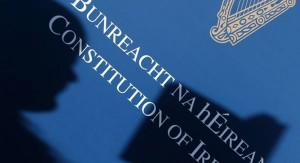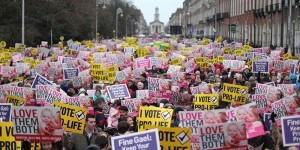
By Susan Gately - 20 February, 2016
 On Thursday, the Labour Party announced that it would make the legalisation of abortion a key priority if elected to government on 26 February.
On Thursday, the Labour Party announced that it would make the legalisation of abortion a key priority if elected to government on 26 February.
At a press conference, Labour said it intended to have a process leading to the repeal of the Eighth Amendment underway by this summer if in government.
Labour minister, Alex White, said the party would have no problem with a process that builds consensus on the issue in order to achieve a referendum.
Fine Gael has proposed holding a citizens’ assembly within six months of re-election before deciding on a Referendum.
Fianna Fáil says it does not intend to have a Referendum on the Eight Amendment but if the issue arises its TDs will be given a free vote.
If elected Labour intends to replace the Eighth Amendment with legislation allowing for terminations on the grounds of risk to life, risk to health, rape and fatal foetal abnormality, “broadly in line” with the 1967 Abortion Act in the UK, according to Labour senator Ivana Bacik.
In his statement earlier this week, Bishop Kevin Doran said the right to life is a fundamental human right.
In 2013, the Government passed legislation which permitted direct abortion in certain circumstances and in recent months there has been a special focus put on abortion for babies with life limiting conditions.
“Much of what is presented as fact is actually quite misleading,” said Bishop Doran.
“Some babies who are seriously ill only live for a very short time, while others live significantly longer. For a Christian, however, there is no such thing as a life without value.”
 Children with life-limiting conditions were entitled to be loved and cared for like any other child, said Bishop Doran, and their parents were “entitled to the support of proper peri-natal hospice services”.
Children with life-limiting conditions were entitled to be loved and cared for like any other child, said Bishop Doran, and their parents were “entitled to the support of proper peri-natal hospice services”.
The Archbishop of Tuam, Michael Neary, said that in this “most significant of centenary years it is more pressing than ever ‘to cherish all the children of the nation equally’ whether unborn or born, and irrespective of a child’s health status”.
He said that an ambition of all public policy makers should be to extend compassion, and provide “tangible and creative resources to women experiencing crisis pregnancies”.
Bishop Doran appealed to the public to make their views known, also using social media and called for support of the family, the “fundamental unit of society”.
“Family breakdown brings with it not only devastating personal costs, but considerable social costs,” he said, noting how it contributed to poverty, homelessness and other forms of social exclusion.
“There is clear evidence that financial difficulties contribute to marital breakdown.”
He deplored the cut in funds to organisations like Accord that support marriage and family and said the next government needed to prioritise the resourcing of such organisations.
“Previous cuts in this area have been detrimental to the wellbeing of families and should be reversed.”
Religious freedom, which is the mark of any true democracy, includes the freedom of the majority as well as the freedom of the minority.
“There is a growing concern that this valuable perspective and experience is being marginalised and devalued, because of political opposition to our principles in key areas such as marriage, health and education,” he said.
What was needed was “a pluralistic, inclusive approach to social service provision that recognises the unique role and contribution of faith-based organisations alongside other providers.”
Bishop Doran pointed to the huge number of families becoming homeless, while the National Asset Management Agency, on behalf of the State, held “an enormous portfolio of property, much of it in the form of houses and apartments”.
He called for “long-term investment in social housing to provide sustainable solutions to the housing issues in our communities” and appealed to any incoming government to bring to bear some diplomatic and even economic pressure in support of Christians now being persecuted in 110 countries.
Bishop Kevin Doran will give a talk on the topic ‘How Should a Catholic Think About Politics?’ next Tuesday, 23 February at 8pm the Clarion Hotel, Sligo.